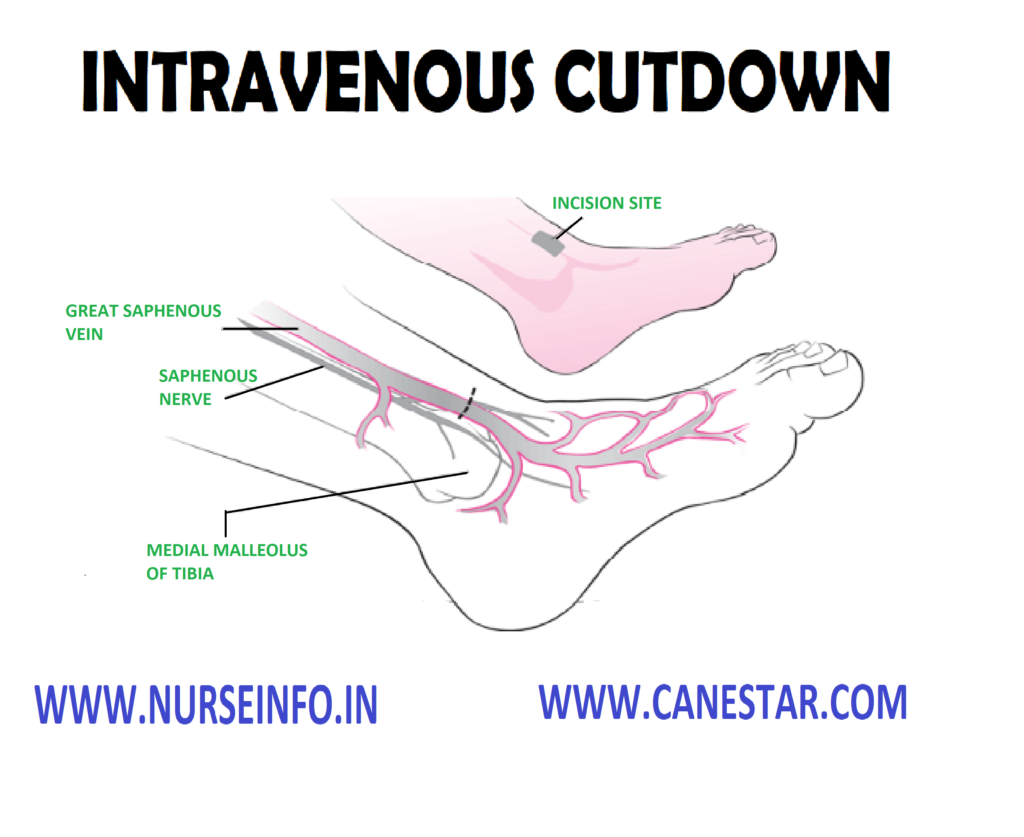INTRAVENOUS CUT DOWN – Purpose, Principle, Preliminary Assessment, Preparation of the Patient, Equipment, Procedure, After Care and Complication
Cut down is a small incision to insert a cannula or catheters directly into the vein or artery.
Whenever the blood vessels become collapsed and invisible, the veins will have to expose opened and a metal cannula or a piece of fine polythene tubing is inserted into the vein to start an infusion.
PURPOSE
- To restore and maintain the child’s fluid and electrolyte balance
- To maintain body homeostasis when the oral intake is inadequate to serve this purpose
- To measure central venous pressure
- To administer larger fluid, e.g. cardiac arrest
PRINCIPLE
- This procedure should carried out by a doctor assisted by a nurse
- Aseptic technique must be adhered throughout all intravenously procedures to prevent bacterial contamination
- The single most effective aseptic procedure is good hand washing technique
- If asepsis is not maintained, local infection, septic phlebitis or septicemia may result
PRELIMINARY ASSESSMENT
- Check the physician’s order for vein cut down
- Take written concern from the patient
- Explain the procedure to the patient
- Win the cooperation of the patient
- Arrange all the articles and make sure that it is available in the unit
PREPARATION OF THE PATIENT
- Explain the procedure to the patient and attendant of the patient. He should conscious to win his confidence and cooperation
- The site of cut down is prepared as for any major surgery
- If any hair is present get the site shaved and cleaned
- The bedding and garments are protected with a Mackintosh and towel
- Prepare all the articles and strict aseptic technique should be followed
EQUIPMENT
IV Solutions
- Betadine solutions
- Alcohol solution 70 degree celcius
- Hypoallergenic tape 1.2 cm, 2.5 cm
- Splint
- Sterile gauze
- Sterile cotton wool
- Sterile drapes
- Sterile cut down tray
- Syringes 2 ml and 5 ml
- Needle 25 and 20 gauge
- The 4/0 black silk suture
- Assorted size of stereopolyethylene tubing
- Local anesthesia as prescribed
- Normal saline 0.9%
- Sterile gloves according to doctor’s size
- Restraining devices
- Sterile gown
- Gallipot
- Hand towel
- Window towel
- Knife handles No. 15 blades
- Forceps
- Scissors
- Gauze and cotton
- Needle holders
PROCEDURE
- Ensure that the physician has explained the procedure to the patient and to gain consent and cooperation
- Position the patient
- Open the cut down set and drop the inner pack into the trolley. Physician scrubs his hands thoroughly up to the elbows for a full 3 minutes
- Dries his hands and grim on the sterile hand towel provided
- Don a sterile gown and the appropriate sized gloves
- Opens the dressing packs. Pour betadine and spirit directly from the bottle into the gallipots
- Under local anesthesia and with aseptic precautions, the skin is incised and the vein is exposed
- The aneurysm needle is passed under it
- The loop of the threat is cut down two strands and is formed under the vein
- Tie the vein to prevent the blood flow
- The vein is then cut partially between the two ligatures
- The cannula is passed into the proximal ligature that is tied the cannula in place
- Wound is closed with interrupted sutures
- Leave it on a comfortable position
AFTER CARE
- After the procedure, the nurse should see that it is secured carefully by using the arm board, bandages, adhesive plaster, etc
- The movement of the patient should not dislodge the IV cannula
- The cut down site is inspected frequently to detect infiltration of fluid and dislodgement of the cannula
- The illusion site should be cleaned and dressed after a week sutures are removed
COMPLICATION
- Infiltration
- Infusion phlebitis
- Thrombosis
- Pyrogenic reaction
- Air embolism
- Circulatory overload
- Shock


